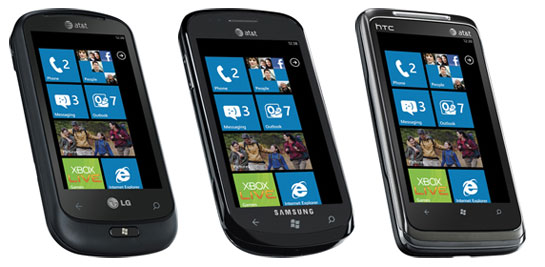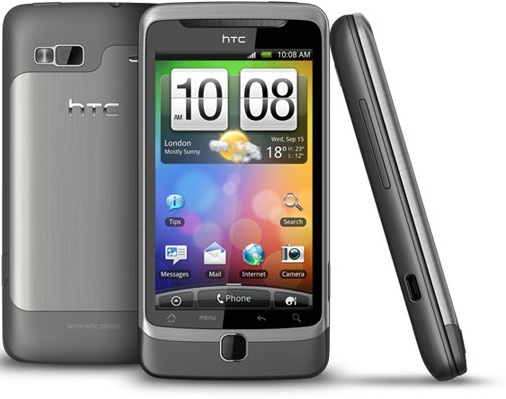
I spent this morning liveblogging Microsoft’s official Windows Phone 7 kickoff here in New York. Even though there wasn’t a lot of brand-new news–Microsoft started showing off the OS months ago, and some of the hardware news had leaked–there was still lots to chew on. Herewith, a few early impressions based on experiencing the keynote and spending twenty minutes fiddling with the phones on display here.
How’s the interface?
We already knew that Windows Phone 7 was an inventive approach to mobile interfaces that owed little either to earlier versions of Windows or the iPhone. (It is, however, reminiscent of the Zune HD and certain aspects of Xbox 360 and Windows Media Center.) It features Tiles (big icons that can display constantly-updated information in a widgety fashion), screens that slide to the left to reveal more stuff (like the iPhone and Android desktops, but inside apps as well), and other distinctive ideas. Judging from the time I spent with some phones this morning, the level of overall polish and fluidity is very good.
It’s not an iPhone-style great leap forward,, but I can certainly imagine some folks actively preferring it to the iPhone interface. And given that Android’s interface remains so-so and the future of HP/Palm’s WebOS on phones is somewhat murky, Windows Phone 7 could end up being the iPhone’s most serious competitor from a usability standpoint.
Any other unique benefits?
Windows Phone 7 has built-in Office apps with editing (although I need more time with them to judge whether they’re better than third-party suites for other phones). It lets you subscribe to music using Microsoft’s Zune Pass service; solid subscription music services are available for other platforms, but they’re not integrated into the OS. Speaking of integration, the music player has an API that permits third-party services such as Slacker to show up–Microsoft’s demo this morning mentioned this feature but didn’t really show how it works.
Window Phone 7 also has lots of hooks into Facebook, Windows Live, and other social networks–it grabs and melds information from them, lets you issue updates and upload photos, aims to make it as easy to browse photos on Facebook as it is to view ones on the phone, etc., etc. This social stuff is ambitious for sure, but I want to live with it for a while before deciding whether it’s a good thing or a bad thing. (I’m instinctively skeptical of phones that aim to support social networks through built-in features rather than excellent stand-alone apps–the disaster known as Microsoft Kin shows how hard it is to pull that off.)
What’s that image at the top of this post?
During this morning’s presentation, Steve Ballmer and company reported all the catch phrases on that slide so often that I almost began chanting along. To some degree, they’re just marketingspeak–no company is going to say that its new product is occasionally delightful, adequately mine, and a sluggish hassle. But Windows Phone 7 is the first evidence I’ve ever seen that Microsoft understands how to make a pleasant, efficient, modern mobile operating system–which has absolutely nothing to do with cramming the Windows interface onto a tiny screen.
What’s missing?
Let’s see. Multitasking for third-party apps; cut and paste (which is coming early in 2011); massive quantities of great apps; the assumption that virtually every new app will be available for your phone; a movie/TV service as comprehensive as iTunes; an ecosystem of accessories to rival the iPhone. I also didn’t see any way to swap out Bing as the default search engine in favor of anything else. (To be fair, the Bing services–including voice search and Maps–look good.) None of these omissions render the operating system DOA, but they need to get fixed, and Microsoft has little time to dawdle. Windows Phone 7 2.0 or Windows Phone 8 or whatever the next version is called needs to fill in most of the obvious holes.
What about big-name third party apps?
Microsoft had surprisingly little to say about that today. It demoed eBay and IMdB, plus a couple of games (including The Sims). The phones that attendees could try out had a few other name-brand apps, including Twitter (which looks similar to the Android version) and Fandango. But I didn’t see Facebook or Foursquare or Bejeweled or other apps that I try to install on a new phone as soon as I get it. (Foursquare has been demoed in the past.)
I do feel hopeful that Microsoft will get one thing right that Google has failed to do so far: doing everything in its power to ensure that third-party apps have a look and feel that’s consistent with the overall interface. All the ones I’ve seen so far, such as eBay, truly feel like Windows Phone 7 programs.
How’s the hardware?

I think it’s a smart move that Windows Phone 7 will be on three AT&T handsets, each based on a 1-GHz Qualcomm Snapdragon CPU and a five-megapixel camera, and each going for $199.99 on contract–but each with its own personality and none resembling the iPhone all that closely. The LG Quantum has a physical keyboard; the HTC Surround has slide-out Dolby Mobile/SRS speakers; the Samsung Focus has a 4.3″ Super AMOLED display. The Focus goes on sale on November 8th, and the other two will follow within a few weeks.
A couple of early hands-on impressions: The Focus feels like a cousin of Samsung’s Galaxy S phones, with an impressively thin case and a display that delivers very, very vivid colors. (Whether they’re too vivid compared to a good LCD is a matter of opinion.) The Quantum’s slide-out landscape keyboard felt pretty good by slide-out landscape keyboard standards, but the slider mechanism was oddly stiff. (This may have been due to interference from the bracket for the cable that fastened the phone to the demo station.)
What’s the deal with AT&T?
It seems to be more serious about Windows Phone 7 than it’s been about Android to date–it’s Microsoft’s “Premier” wireless company for now, and the initial lineup of handsets looks decent. It also looks like AT&T has integrated some of its own stuff (including an app for its U-Verse TV service that’s available both to subscribers and non-subscribers) without munging up the Windows Phone 7 experience. Here at the event, I spoke with David Christopher, Chief Marketing Officer of AT&T’s wireless unit, and he seemed genuinely enthusiastic about Windows Phone 7. Would it surprise you to hear that he cheerfully refused to answer direct questions relating to AT&T’s iPhone exclusivity and whether the new Microsoft phones will help the carrier prepare for the era of the Verizon iPhone?
What are Windows Phone 7’s chances?
Ooh, I was afraid you’d ask that. It’s unknowable at this point, really. Microsoft let Apple build up an unimaginably gigantic lead in the market for next-generation smartphones, and now it has to catch up with Android, too. It’s incredibly daunting, and these phones–which are version 1.0 products despite the “7” in the name–aren’t going to get Microsoft anywhere close to parity. On the other hand, I’m impressed with Windows Phone 7 overall–and I can’t think of a different strategy that the one Microsoft seems to be following that would have a better shot at success. This is going to be fun to watch…

 HTC chose CES as the launchpad for three new Android 2.2-enabled smartphones for 4G networks. One of these phones, the EVO Shift 4G, is a slider that will complement HTC’s original EVO and Samung’s Epic 4G on Sprint’s WiMax network. Rounding out the trio are the Inspire 4G for AT&T and the ThunderBolt, one of 10 new phones and other devices from various vendors now announced for release for Verizon’s 4G network.
HTC chose CES as the launchpad for three new Android 2.2-enabled smartphones for 4G networks. One of these phones, the EVO Shift 4G, is a slider that will complement HTC’s original EVO and Samung’s Epic 4G on Sprint’s WiMax network. Rounding out the trio are the Inspire 4G for AT&T and the ThunderBolt, one of 10 new phones and other devices from various vendors now announced for release for Verizon’s 4G network.


 It’s telling that HTC doesn’t refer to Sense as a user interface or a layer atop its Android phones, but rather as a “
It’s telling that HTC doesn’t refer to Sense as a user interface or a layer atop its Android phones, but rather as a “ Smartphone maker
Smartphone maker 

 Finally, news about smartphones and patents that doesn’t involve large companies suing each other: Microsoft has announced that it’s
Finally, news about smartphones and patents that doesn’t involve large companies suing each other: Microsoft has announced that it’s